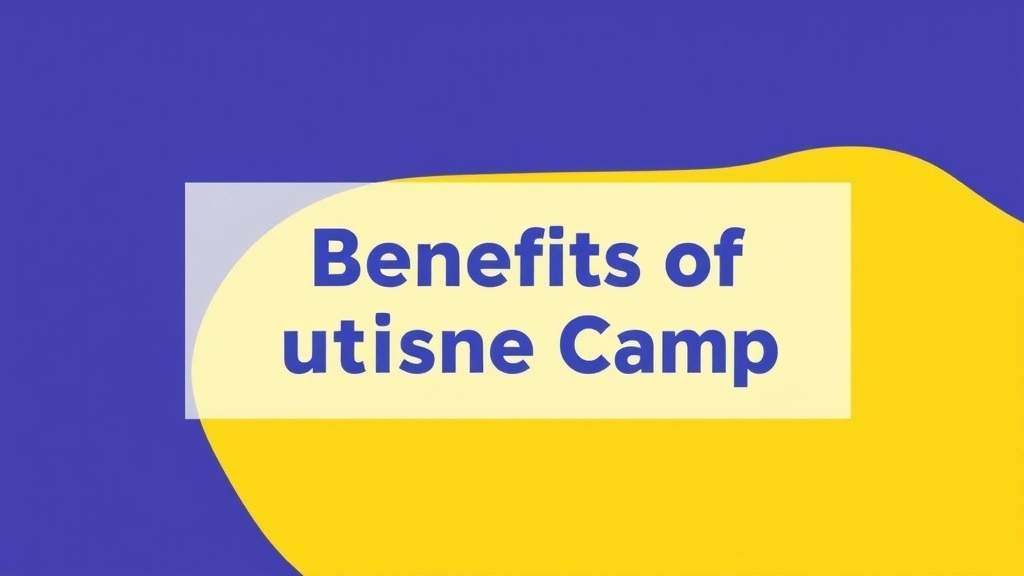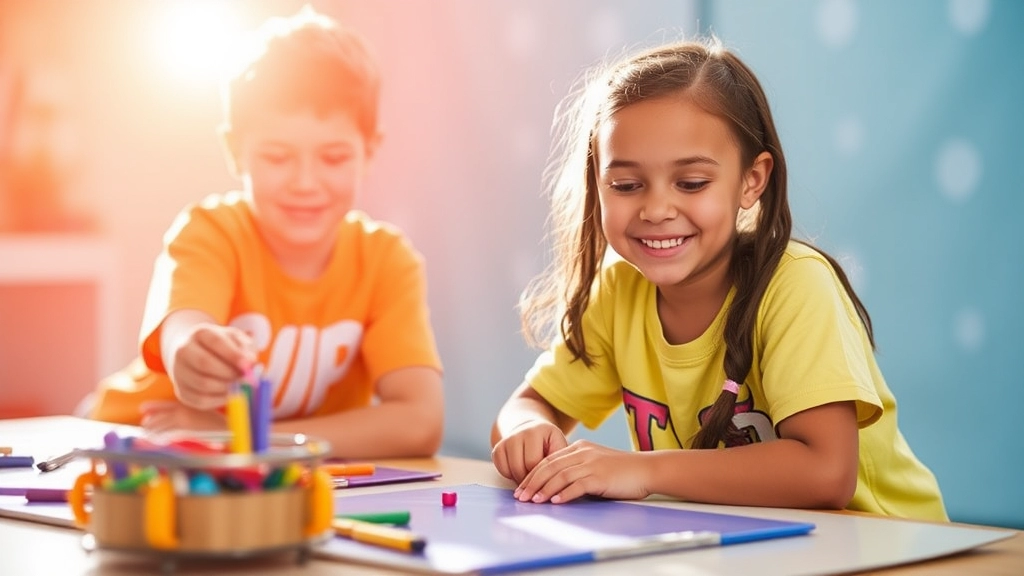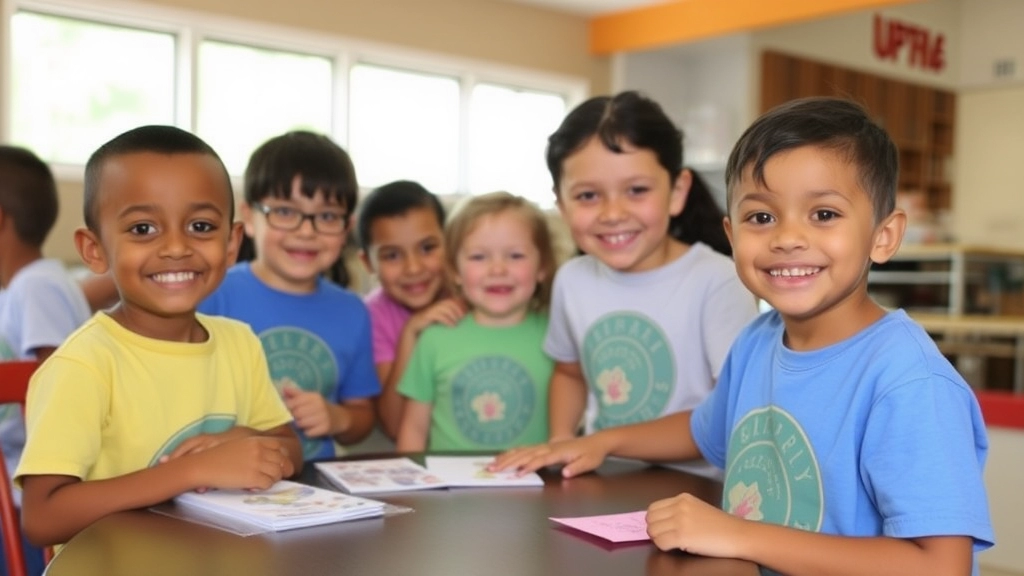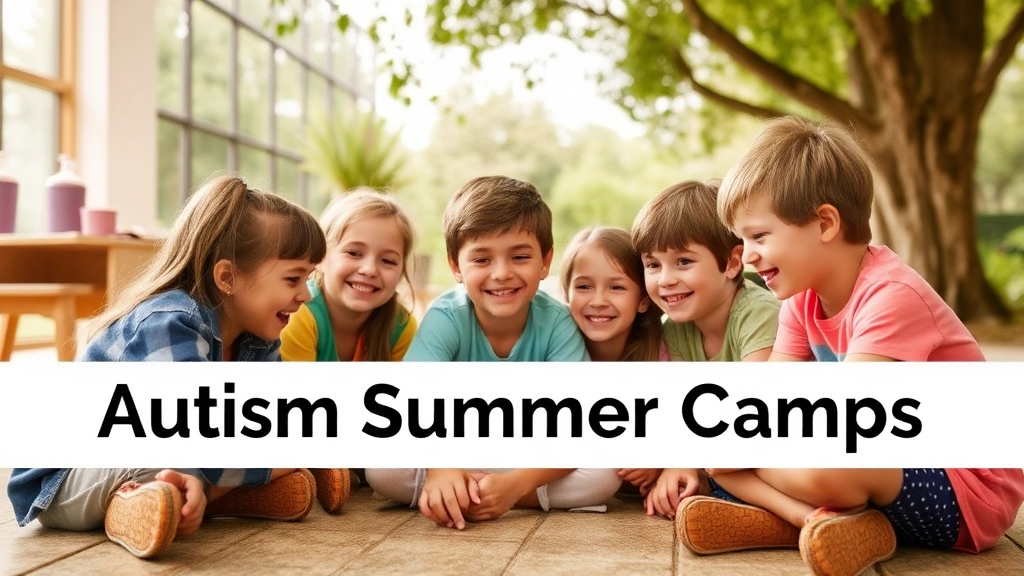Choosing the Right Summer Camp for a Child with Autism
Choosing the right summer camp for a child with autism can be a daunting task, but it’s a journey worth taking. Autism summer camps come in various forms, from day camps to residential and specialized programs, each offering unique benefits tailored to meet the diverse needs of children on the autism spectrum. These camps provide an environment where children can thrive, gain independence, and build social skills, all while having fun.
What to Expect
In this article, we’ll explore the different types of autism summer camps available, the myriad benefits they offer, and how to select the perfect camp for your child. We’ll also delve into the activities and programs these camps provide, share tips on preparing your child for camp, and highlight success stories that showcase the transformative power of these experiences.
Empowering Parents
Whether you’re a seasoned parent of a camper or considering it for the first time, this guide aims to equip you with the knowledge and confidence to make the best choice for your child’s summer adventure.
Types of Autism Summer Camps
When it comes to autism summer camps, parents often wonder: “What types are out there, and which one is right for my child?” Let’s break it down.
Day Camps
Day camps are perfect if you’re looking for something local and less intense. They offer a structured environment during the day, allowing your child to return home each evening. Benefits include:
- Consistent routine: Your child can enjoy camp activities while maintaining their home routine.
- Social interaction: Opportunities to make friends and build social skills.
- Local access: Usually close to home, reducing travel stress.
Residential Camps
Residential camps offer a more immersive experience. Kids stay overnight, often for a week or more. Why choose residential?
- Independence: Encourages self-reliance and responsibility.
- Deep connections: Longer stays mean more time to bond with peers.
- Full experience: Access to a wider range of activities.
Specialised Camps
Some camps focus on specific interests or therapies. Think art, music, or outdoor adventures. Specialised camps can be a game-changer because:
- Tailored activities: Matches your child’s interests and needs.
- Expert staff: Often led by professionals in the field.
- Focused development: Targets specific skills or therapies.
Inclusive Camps
These camps mix neurotypical kids with those on the autism spectrum. Why consider inclusive camps?
- Diverse environment: Promotes understanding and acceptance.
- Shared activities: Encourages collaboration and teamwork.
- Balanced support: Offers a mix of structured and flexible activities.
Real Questions, Real Answers
“Will my child fit in?” That’s a common worry. Each camp is designed with specific needs in mind, ensuring your child feels supported.
“What if they struggle with change?” Camps often have transition plans and experienced staff to help ease any anxiety.
Choosing the right autism summer camp can feel overwhelming, but understanding the different types makes it easier. Whether it’s a day camp or a residential camp, there’s something out there that can provide a fantastic experience for your child.
For more information on creating a safe and enjoyable camp experience, check out our guide on essential guidelines for safety. And if you’re looking for some fun activities to keep your child engaged, don’t miss our list of summer camp activities.
Benefits of Autism Summer Camps

Ever wondered why autism summer camps are a big deal?
Let’s dive in.
Why Autism Summer Camps Matter
For many parents, the idea of sending their child to a summer camp can be nerve-wracking, especially when autism is in the picture.
But here’s the thing: these camps can be game-changers.
Social Skills Boost
Kids with autism often struggle with social interactions.
Autism summer camps provide a safe space for:
- Making Friends: Kids meet peers who “get” them.
- Practising Social Skills: Real-life scenarios to improve communication.
- Building Confidence: Success in social settings boosts self-esteem.
Personal Growth and Independence
These camps help kids become more independent.
How?
- Daily Routines: Structured activities teach time management.
- Self-Care: Learning to manage personal needs.
- Decision-Making: Making choices in a supportive environment.
Fun and Learning Combined
It’s not just about therapy.
It’s about having fun while learning.
- Outdoor Activities: From hiking to swimming, kids get to enjoy nature.
- Creative Arts: Music, painting, and drama to express themselves.
- Sports: Physical activities tailored to their abilities.
Tailored Support
Autism camps are staffed with trained professionals.
They know how to handle meltdowns, sensory issues, and communication challenges.
- Specialised Staff: Trained in autism-specific strategies.
- Therapeutic Activities: Designed to meet individual needs.
- Safe Environment: Ensuring kids feel secure and understood.
Parent Peace of Mind
Let’s be real.
Knowing your child is in good hands is priceless.
- Regular Updates: Many camps provide daily reports.
- Parent Workshops: Some offer sessions to help you support your child.
- Community Support: Connect with other parents facing similar challenges.
Success Stories
I’ve heard countless stories from parents who were initially hesitant but saw incredible changes in their kids.
Like Jane, whose son never spoke more than a few words.
After a summer camp, he started forming sentences.
Or Mark, who was terrified of water.
By the end of camp, he was swimming like a fish.
Wrapping It Up
Autism summer camps offer a unique blend of fun, growth, and support.
They’re more than just a break for parents.
They’re a stepping stone for kids to thrive.
How to Choose the Right Autism Summer Camp
Alright, so you’re thinking about sending your child to an autism summer camp. But how do you choose the right one? It’s a big decision, and I get it â there’s a lot riding on this. Let’s break it down.
What Are Your Main Concerns?
Most parents worry about a few key things:
- Will the camp staff understand my child’s needs?
- Is the camp safe?
- Will my child have fun and make friends?
These are all valid concerns, and addressing them will help you find the right camp.
Types of Camps
First off, know what types of camps are out there. Here’s a quick rundown:
- Day Camps: Your child goes to camp during the day and comes home in the evening. Great for younger kids or those who might not be ready for overnight stays.
- Overnight Camps: These are more immersive. Kids stay for a week or more. Ideal for building independence.
- Specialised Camps: These camps focus on specific interests like sports, arts, or science but are tailored for kids with autism.
- Therapeutic Camps: These camps offer therapies alongside regular camp activities. Think of it as a mix of fun and functional.
What to Look for in a Camp
When you’re evaluating camps, keep an eye out for these key elements:
- Staff Training: Are the staff trained in autism care? Do they understand sensory issues, communication challenges, and behavioural needs?
- Safety Measures: How does the camp ensure safety? This includes medical facilities, emergency protocols, and staff-to-camper ratios.
- Activities Offered: Are the activities suitable and engaging for children with autism? Look for sensory-friendly options and structured schedules.
- Parent Reviews: What do other parents say? Real-life testimonials can give you a good sense of what to expect.
- Communication: How does the camp communicate with parents? Regular updates can ease your worries and keep you in the loop.
Questions to Ask
When you talk to camp directors, don’t be shy. Ask these questions:
- What is the staff-to-camper ratio?
- What types of training do staff members receive?
- How do you handle behavioural issues?
- Can you accommodate my child’s specific needs (dietary restrictions, medical conditions, etc.)?
- What does a typical day look like?
Making the Final Decision
After you’ve gathered all the info, sit down and weigh the pros and cons. Here’s a simple table to help you compare:
| Criteria | Camp A | Camp B | Camp C |
|---|---|---|---|
| Staff Training | Yes | No | Yes |
| Safety Measures | Good | Fair | Excellent |
| Activities | Great | Good | Excellent |
| Parent Reviews | 4.5/5 | 3/5 | 5/5 |
| Communication | Regular | Rare | Daily |
Real-Life Example
Let me share a quick story. A friend of mine, Sarah, was in the same boat last summer. She found a camp that seemed perfect on paper but had mixed reviews. She decided to visit the camp herself, met the staff, and even talked to some parents whose kids had attended. That firsthand experience gave her the confidence to enrol her son, and guess what? He had the time of his life.
So, the keyword here is research. Do your homework, ask the right questions, and trust your gut. The right autism summer camp is out there, and with a little effort, you’ll find it. For additional resources, you might want to check out some special needs summer camps and explore various summer camp field trips to enhance your child’s experience.
Activities and Programs at Autism Summer Camps

Ever wondered what your child will do at an autism summer camp?
You’re not alone.
Many parents worry about whether their kids will have fun, make friends, and learn new skills.
So, let’s break it down.
Structured Activities
Autism summer camps offer a range of structured activities designed to engage and support children with autism.
These activities include:
- Arts and Crafts: Think painting, drawing, and creating. It’s more than just fun; it’s therapy.
- Music Therapy: Playing instruments, singing, and even dancing. It helps with sensory processing and social skills.
- Sports and Physical Activities: From swimming to hiking, these activities build motor skills and boost confidence.
- Social Skills Groups: Guided interactions to help kids learn how to make friends and communicate better.
Specialised Programs
These camps aren’t just about keeping kids busy.
They’re about tailored programs that meet each child’s needs.
- Behavioural Therapy Sessions: Professional therapists work with kids on specific behavioural goals.
- Speech and Language Therapy: Helping children improve their communication skills.
- Occupational Therapy: Activities that help with daily living skills, like dressing and eating.
Sensory-Friendly Environments
Autism summer camps understand sensory sensitivities.
They create environments where kids feel safe and comfortable.
- Quiet Zones: Areas where kids can take a break if they feel overwhelmed.
- Sensory Rooms: Spaces filled with calming lights, textures, and sounds.
Real-Life Skills
These camps also focus on teaching practical skills.
- Cooking Classes: Simple recipes that kids can make themselves.
- Gardening: Learning to plant and care for vegetables and flowers.
- Money Management: Basic lessons on handling money.
Fun and Games
Don’t forget the fun part.
- Treasure Hunts: Engaging and exciting, helping kids with problem-solving.
- Drama and Role-Playing: Great for building confidence and imagination.
- Group Games: Encouraging teamwork and social interaction.
Stories from the Campfire
Let me share a quick story.
One parent told me how their child, who rarely spoke at home, started singing songs they learned at camp.
Another parent mentioned their child made a friend for the first time.
These camps really can make a difference.
Why It Matters
The activities and programs at autism summer camps aren’t just about keeping kids occupied.
They’re about growth, learning, and having a blast.
So, if you’re considering an autism summer camp, know that your child will be in good hands.
They’ll come back with new skills, new friends, and a big smile.
Ready to explore more?
Check out our resources for finding the perfect autism summer camp for your child.
Preparing Your Child for Autism Summer Camp
So, you’re thinking about sending your child to an autism summer camp. It’s exciting, but let’s be realâit’s also a bit nerve-wracking. Will they fit in? What if they get homesick? How do you even start preparing them? You’re not alone in these thoughts, and I’m here to help make this transition smoother.
Why Preparation Matters
Getting ready for an autism summer camp isn’t just about packing the right clothes. It’s about setting your child up for a successful experience. Here’s how you can do that:
Start with Conversations
Talk About the Camp Experience
- Discuss What to Expect: Explain the daily routine at camp. Knowing what’s coming can ease anxiety.
- Address Concerns: Ask your child what they’re worried about and tackle those fears together.
Visit the Camp
- Take a Tour: If possible, visit the camp beforehand. Familiarity with the environment can be comforting.
- Meet the Staff: Introduce your child to the camp leaders. Faces they recognise can be a source of reassurance.
Build Social Skills
Practice Social Scenarios
- Role-Playing: Act out potential social situations they might face at camp.
- Communication Skills: Encourage simple conversations with family or friends to boost confidence.
Pack Smart
- Create a Checklist: Involve your child in packing. Knowing they have their favourite items can be calming.
- Label Everything: This helps them keep track of their belongings.
Establish a Routine
- Mimic Camp Schedules: Gradually adjust bedtime and wake-up times to align with the camp’s schedule.
- Daily Activities: Incorporate similar activities into their routine, like arts and crafts or outdoor play.
Encourage Independence
- Self-Care Skills: Teach them how to manage personal hygiene and dressing independently.
- Decision-Making: Let them make small decisions, like choosing meals or activities.
Real Stories: Success from Preparation
I remember chatting with a parent whose child was initially hesitant about camp. They spent a few weeks role-playing and visiting the camp, and by the time camp started, their child was eager and ready. The preparation paid off, and their child came back with newfound confidence and friends.
For more tips on packing for summer camps, check out our Ultimate Checklist for Packing for Summer Camp. If you’re looking for engaging activities, our guide on Fun Summer Camp Crafts for Kids is a must-read!
Success Stories from Autism Summer Camps

Ever wondered if autism summer camps really make a difference?
I get it.
You’re probably asking, “Will my child actually benefit from this?”
Let’s dive into some real success stories.
Real Transformations
Meet Jamie.
Before camp, Jamie struggled with social interactions.
After just one summer, he came back more confident and open.
His parents noticed he was making eye contact and even initiating conversations.
Then there’s Sarah.
She had severe sensory issues.
The camp’s tailored activities helped her manage these challenges.
Now, she enjoys family outings without feeling overwhelmed.
What Makes These Camps Work?
- Personalised Attention: Small groups ensure each child gets the support they need.
- Structured Environment: Routine helps kids feel secure and thrive.
- Specialised Staff: Trained professionals who understand autism.
Why These Stories Matter
These stories aren’t just feel-good tales.
They show real, tangible progress.
They prove that with the right environment, kids can unlock their potential.
How Can Your Child Experience This?
- Research Camps: Look for those with proven track records.
- Visit and Ask Questions: Get a feel for the place and staff.
- Talk to Other Parents: Their insights can be invaluable.
Final Thoughts
Autism summer camps can be life-changing.
They offer a supportive space where kids can grow and shine.
And who knows?
Your child might be the next success story.
Want to find the right camp for your child?
Check out our resources on finding autism summer camps.
Frequently Asked Questions About Autism Summer Camps
Let’s dive into the questions that keep popping up about autism summer camps. I get itâsending your child to a camp can be nerve-wracking, especially when they have autism. So, let’s tackle these worries head-on.
What Are Autism Summer Camps?
Autism summer camps are specialised camps designed to cater to children and young adults on the autism spectrum. They focus on creating a supportive environment where campers can enjoy activities tailored to their needs. Think of them as a mix of fun and therapy.
Why Consider an Autism Summer Camp?
Here’s the thingâthese camps offer a break from routine while providing a structured environment. They help in developing social skills, boosting confidence, and encouraging independence. It’s like hitting two birds with one stone: fun and growth.
How Do I Know If a Camp Is Right for My Child?
Choosing the right camp is crucial. Consider these points:
- Staff Training: Are the staff trained in autism-specific approaches?
- Activities: Do the activities match your child’s interests and abilities?
- Safety Measures: What protocols are in place for emergencies?
- Feedback: Look for reviews or ask other parents about their experiences.
What If My Child Has Never Been Away from Home?
This is a big one. Many parents worry about separation anxiety. Start with:
- Shorter Sessions: Opt for day camps or shorter residential stays.
- Visit Beforehand: If possible, visit the camp with your child to familiarise them with the environment.
- Talk It Through: Explain the camp experience in simple terms, focusing on the fun aspects.
Are These Camps Only for High-Functioning Autism?
Nope, autism summer camps cater to a wide range of abilities. They often have different programs to suit individual needs. It’s about finding the right fit for your child.
What Kind of Activities Can My Child Expect?
Activities are varied and designed to be inclusive. They might include:
- Arts and Crafts: Encourage creativity and fine motor skills.
- Outdoor Adventures: Hiking, swimming, or team sports.
- Music and Drama: Great for expression and building confidence.
- Social Skills Workshops: Focused on interaction and communication.
How Do I Prepare My Child for Camp?
Preparation is key. Here’s a quick checklist:
- Routine: Gradually introduce camp-like routines at home.
- Packing Together: Involve your child in packing to make them feel more in control.
- Communication Tools: Ensure they have ways to communicate their needs, like visual aids or communication devices.
Are There Any Success Stories?
Absolutely. Many parents report significant improvements in their child’s social skills and self-esteem after attending camp. It’s like watching them blossom in a supportive setting.
Where Can I Find More Information?
For more resources, check out organisations like the National Autistic Society or local support groups. They often have lists of recommended camps. If you’re looking for camps that cater to specific needs, you might want to explore special needs summer camps. Additionally, for parents who are concerned about transportation logistics, our guide on summer camps with transportation can be very helpful.
Resources for Finding Autism Summer Camps
Ever found yourself wondering, “Where can I find the best autism summer camps for my child?”
I get it. The search can be overwhelming.
But don’t worry. I’ve got you covered.
Finding the right camp is crucial, and there are some fantastic resources out there to help you.
So, let’s dive in.
Online Directories
Autism Society
- Why it’s great: They’ve got a comprehensive list of camps tailored for kids with autism.
- How to use it: Just head to their website, and you’ll find all the info you need.
MySummerCamps.com
- Why it’s great: This site offers a filter to search specifically for autism-friendly camps.
- How to use it: Go to the site, use the filter, and boomâyou’ve got a list of options.
Local Autism Organisations
National Autistic Society (NAS)
- Why it’s great: They provide localised info and can point you to camps in your area.
- How to use it: Check out their website or give them a call.
Autism Support Groups
- Why it’s great: Real parents, real experiences. You get the lowdown on what works and what doesn’t.
- How to use it: Join a local or online group and ask for recommendations.
Social Media
Facebook Groups
- Why it’s great: Tons of parents share their experiences and recommendations.
- How to use it: Search for autism support groups and join the conversation.
Instagram Hashtags
- Why it’s great: You can find posts from camps and see what they’re all about.
- How to use it: Try hashtags like #AutismCamp or #AutismSummerCamp.
School and Healthcare Providers
Special Education Teachers
- Why it’s great: They often know about local camps that cater to kids with autism.
- How to use it: Just ask your child’s teacher for recommendations.
Therapists and Doctors
- Why it’s great: They can suggest camps that align with your child’s needs.
- How to use it: Bring it up during your next appointment.
Word of Mouth
Friends and Family
- Why it’s great: Personal recommendations from people you trust.
- How to use it: Ask around. Someone might know the perfect camp.
For additional tips on how to keep your child cool and comfortable during summer camps, check out our guide on keeping your camper cool in summer. And if you’re looking for creative ways to make your camp stand out, our article on creative summer camp sign ideas might be just what you need.
FAQs about Autism Summer Camps
What are the key benefits of autism summer camps?
Autism summer camps offer a unique blend of fun, growth, and support. They help children with autism improve social skills, gain independence, and enjoy a variety of activities in a safe environment.
How do these camps help with social skills?
Autism summer camps provide a safe space for children to make friends, practice social interactions, and build confidence through real-life scenarios and guided activities.
What kind of activities can my child expect at an autism summer camp?
Camps offer structured activities such as arts and crafts, music therapy, sports, and social skills groups, all designed to engage and support children with autism.
Are the staff at these camps specially trained?
Yes, autism camps are staffed with trained professionals skilled in autism-specific strategies, ensuring they can handle meltdowns, sensory issues, and communication challenges effectively.
How do these camps support personal growth and independence?
Through structured daily routines, self-care activities, and decision-making opportunities, camps help children learn time management, personal care, and independent living skills.
What specialized programs are available at these camps?
Many camps offer tailored programs like behavioral therapy sessions, speech and language therapy, and occupational therapy to meet each child’s specific needs.
How do autism summer camps create sensory-friendly environments?
Camps provide sensory-friendly spaces with quiet zones and sensory rooms filled with calming lights, textures, and sounds to ensure children feel safe and comfortable.
Can you share success stories from these camps?
Parents have shared stories of children gaining confidence, improving social interactions, and overcoming sensory challenges, demonstrating the tangible progress made at these camps.
How can I find the right autism summer camp for my child?
Research camps with proven track records, visit and ask questions, and talk to other parents for insights. Our resources can help you find the perfect camp for your child.
References
-
Autism Speaks: Autism Summer Camps
-
Verywell Health: Best Summer Camps for Kids with Autism
-
Child Mind Institute: Summer Camps for Kids with Autism

